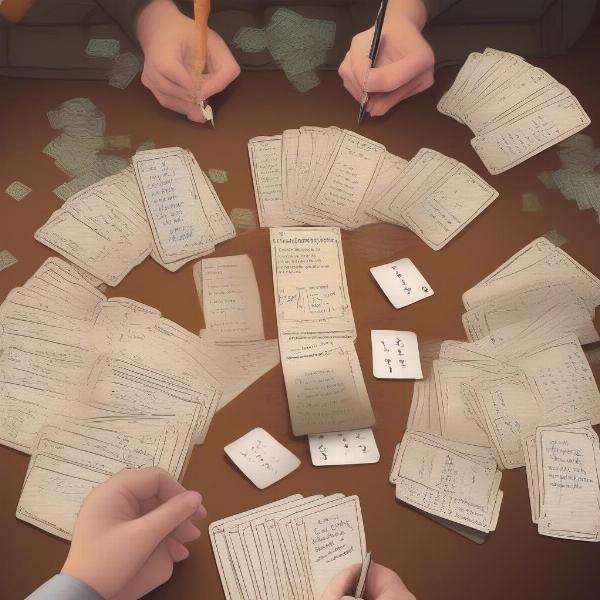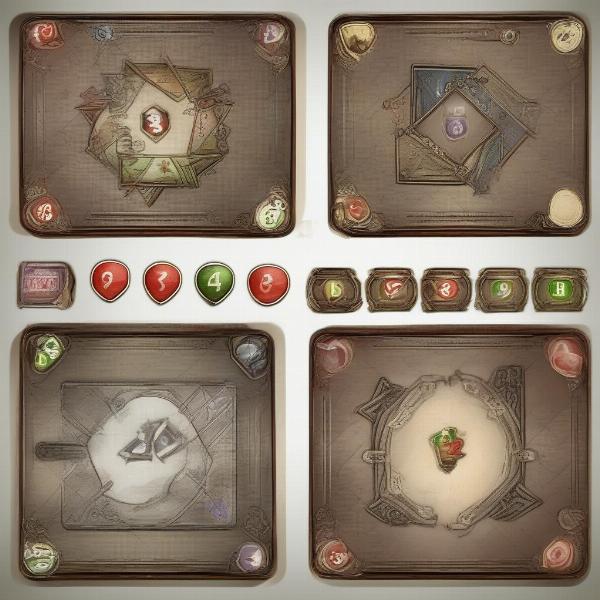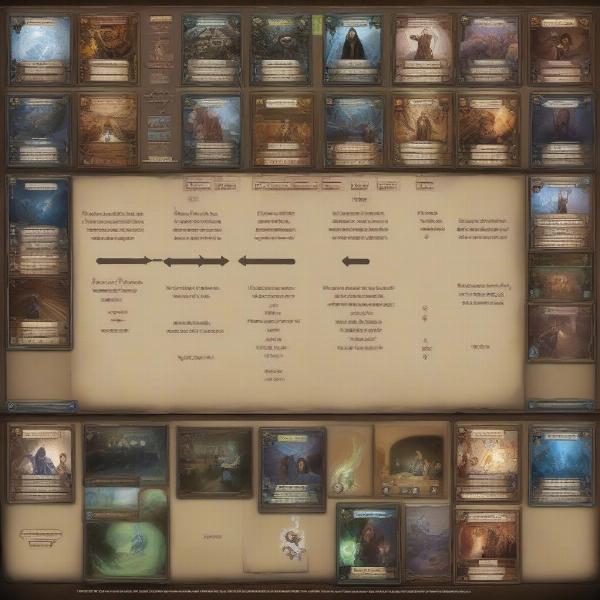Learning how to play the Wizard card game is easier than you might think! This comprehensive guide will walk you through everything you need to know, from the basic rules and gameplay to advanced strategies. Whether you’re a seasoned card game veteran or a complete newbie, this guide will equip you with the knowledge to become a Wizard master.
This thrilling trick-taking card game combines elements of chance and strategy, making it endlessly replayable and engaging for players of all ages. We’ll cover everything from setting up the game, dealing cards, bidding, playing tricks, and scoring – all explained in a clear and concise manner. So, grab your deck and let’s dive in!
Understanding the Wizard Card Game Basics
Before we begin playing, let’s familiarize ourselves with the game’s essential components. The Wizard card game uses a specialized deck of cards, typically containing 60 cards: four suits (hearts, diamonds, clubs, spades) each with numbered cards from 1 to 14, and four Wizard cards and four Jester cards. The Wizard card is a trump and always wins a trick, while the Jester is worthless in a trick.
Setting Up the Game
- Shuffle the deck thoroughly. This ensures fairness and randomness, a crucial aspect of the Wizard card game.
- Deal the cards. The number of cards dealt depends on the number of players. Each player receives an equal number of cards, keeping any remaining cards aside as the talon (unused cards).
- Examine your hand. Assess your cards’ strength and potential for winning tricks.
Bidding in Wizard: A Key to Victory
The bidding phase is arguably the most crucial part of the Wizard card game. Before playing any cards, each player secretly bids the number of tricks they believe they can win. The sum of all bids must equal the number of tricks in the round. Accurate bidding requires a keen understanding of your own hand and your opponents’ potential strengths.
What are the implications of bidding?
- Underbidding: If you underbid, you will score fewer points.
- Overbidding: If you overbid, you may lose points, negatively impacting your overall score.
- Exact Bid: Achieving an accurate bid is crucial to accumulate points efficiently.
How to improve your bidding strategy?
- Observe your opponents: Pay attention to their bidding patterns to potentially deduce the strength of their hands.
- Consider the cards played: The cards already played can give you clues about the cards your opponents still hold.
- Practice: As with any card game, the more you play, the better you will get.
 Bidding in Wizard Card Game
Bidding in Wizard Card Game
Playing the Tricks: Winning and Losing
Once bidding is complete, the player to the dealer’s left leads the first trick. Each player must follow suit if possible. If a player cannot follow suit, they can play any card from their hand. The highest card of the led suit wins the trick, unless a Wizard card is played, in which case the Wizard always wins.
How to win tricks consistently
- Play strategically: Avoid leading with your high cards early.
- Observe your opponents: Analyze their plays to gauge the strength of their remaining hands.
- Use your Wizard wisely: Save your Wizard for crucial situations where it can secure a winning trick.
Scoring and Winning the Game
Points are awarded based on the number of tricks a player successfully wins compared to their bid. You earn points for fulfilling your bid and additional points for each trick won exceeding the bid. However, points are deducted for each trick that a player fails to win compared to their bid. The first player to reach a predetermined score (usually 60 or 100 points) wins the game.
Mastering scoring and point management
- Understand the scoring system: Familiarize yourself with how points are awarded and deducted.
- Manage your risk: Avoid making large bids if you are uncertain about winning the corresponding amount of tricks.
- Calculate your potential score: Before making a bid, mentally evaluate your hand’s potential.
“The key to mastering Wizard is not just knowing the rules, but also understanding the psychology of bidding and the strategic deployment of your cards,” says renowned card game expert, Professor Alistair Finch.
Advanced Strategies in the Wizard Card Game
Understanding card probabilities
This involves knowing the likelihood of certain cards being held by your opponents. For example, if a particular suit has been played extensively, it is less likely that your opponents have high cards remaining in that suit.
Bluffing and deception
Mastering bluffing can significantly improve your chances of winning. By skillfully misleading your opponents, you can cause them to misjudge your hand, making them play their cards less effectively.
“Bluffing isn’t about lying; it’s about managing information,” remarks renowned gaming strategist, Dr. Evelyn Reed. “A successful bluff is one that cleverly obscures your true intentions while guiding your opponents toward the outcomes you desire.”
 Advanced Strategies in Wizard
Advanced Strategies in Wizard
Variations and House Rules
The Wizard card game also features several variations and house rules that can adapt gameplay based on different player preferences. These variations mostly affect the point system or the bidding aspect.
Variants affecting the point system
- Some variations offer bonus points for specific achievements.
- Some variations change how penalty points are applied.
Variants altering the bidding system
- In some variations, bidding can be conducted openly.
- Other variations might add specific rules to the bidding process.
Frequently Asked Questions (FAQ)
Q: How many players can play Wizard?
A: Wizard can be played with 3 to 6 players.
Q: What happens if I run out of cards during a trick?
A: You simply pass on that trick.
Q: Can I change my bid after I’ve made it?
A: No, bids are final once revealed.
Q: What happens if everyone bids the same number of tricks?
A: It’s a perfectly valid situation. The game proceeds as usual.
Q: What is the best strategy for beginners?
A: Focus on accurate bidding and try to win at least your bid number of tricks.
Q: Is there an optimal way to use my Wizard card?
A: It’s best to save your Wizard for later in the game to secure crucial tricks.
Q: Where can I find a Wizard card deck to play?
A: You can find Wizard card decks online or at most game stores.
 Wizard Card Game Variations
Wizard Card Game Variations
Conclusion
Learning how to play the Wizard card game opens up a world of strategic fun and competitive excitement. By mastering the basics of bidding, trick-taking, and scoring, you’ll be well on your way to becoming a formidable Wizard player. Remember to practice regularly, adapt your strategies, and enjoy the thrilling challenge of outsmarting your opponents! So, gather your friends, grab a deck, and experience the magic of the Wizard card game!

